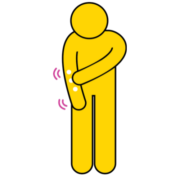What should I do if I have pancreatic cancer symptoms during the coronavirus pandemic?
Coronavirus may be dominating the news at the moment, but pancreatic cancer remains as important as ever. Although GP practices may be changing the way that they run appointments or interact with you, they are still available for you and it is vital that you contact them if you have any of the symptoms of pancreatic cancer.
Pancreatic cancer symptoms during the coronavirus pandemic
It is important to remember during the coronavirus pandemic, that other diseases like pancreatic cancer have not gone away and the sooner you contact a GP with symptoms, the earlier a possible diagnosis can be made.
You may be worried about contacting your GP with symptoms. But there is little risk of catching coronavirus while attending a GP appointment. Patients with coronavirus symptoms are being encouraged to stay away from GP practices and to use NHS111 and NHS online/inform for symptom and testing advice.
If you have pancreatic cancer symptoms and are nervous about attending a hospital for diagnostic tests, contacting your GP will allow them to follow up on your case and diagnose the cause of your symptoms the safest way possible.
Symptoms of pancreatic cancer
The common signs and symptoms of pancreatic cancer can be vague and not everyone will have the same pattern of symptoms. If you have any of the symptoms below that are not usual for you or worsening, you should contact your GP or NHS 111.
If you are experiencing jaundice, this requires urgent medical attention and you should contact 111 immediately.
Click to see full list of symptoms below.
Why is it important to see your doctor with symptoms?
The key to successfully treating and surviving pancreatic cancer is early diagnosis. If the disease can be diagnosed at an early stage, in time for surgery and before the tumour has spread or grown too large, 5-year survival increases from under 8% to over 30%. It is therefore very important that you act quickly and contact a medical professional if you have pancreatic cancer symptoms.
How is coronavirus affecting cancer diagnosis?
The top priority of your GP will be to keep you and other patients safe during this time. Because of this, the way that your appointment is managed may change. When you contact the surgery, you may be given a telephone, email or online/video appointment instead of being asked to visit in person. Local GP surgeries are often working together, and if you need to see a GP face to face you may be asked to visit a different practice to your usual.
If you are concerned about any symptoms outside of GP hours or prior to your appointment you can still use the NHS website and 111 telephone service for more information and advice.
In the case of a medical emergency, you should dial 999.
Although hospitals are currently prioritising the most urgent referrals, presenting with symptoms remains important. Your GP and hospital team can work together with you to decide based on your personal risk of coronavirus, the best time to carry out diagnostics. That may be urgently, or alternatively, your details may be kept on record so that your case can be followed up later.
If you need diagnostic tests, hospital teams will contact you via telephone to discuss your symptoms with you and what to expect. Although some diagnostic tests such as endoscopy are in the short term unavailable, others such as CT are still running and are helpful in making a diagnosis.
Symptoms
- Jaundice – yellowing of the skin and whites of the eyes, and/or very itchy skin.
- Upper abdominal pain or discomfort – which may radiate to the back
- Mid back pain or discomfort – where a bra strap would sit and may be eased by leaning forward
- Pale and smelly stools – that don’t flush easily
- Loss of appetite – not feeling like eating
- Indigestion – that doesn’t respond to medication
- Nausea and vomiting – feeling and/or being sick
- New onset diabetes – not associated with weight gain
- Fatigue – feeling extremely tired
- Unexplained weight loss – weight loss without trying
